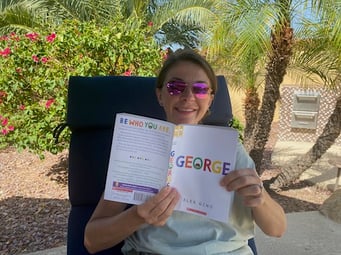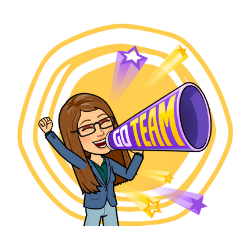George by Alex Gino is a winner of the Stonewall Book award, the Lambda Literary Award, and the E.B. White Honor. The SEL themes to address are self-perception, identity, diversity, resilience, overcoming obstacles, relationships, bullying, rumors/gossip, kindness, and compassion. This story is meaningful and will spark important conversations that need to be had. If this story can't be read during class, perhaps it's a story that could be shared at home.
Overview
This story is about a character named George, who is 10 years old. Now, I know that I'm suggesting this book for middle school-age children, so obviously, the reason I am recommending this book to students at that age is not the age of the character. It's about the subject matter, and in some school districts, this topic will not be an acceptable one to approach in the classroom. However, I think this is an important topic, and it's handled in the most sensitive way possible—through the eyes of a 10-year-old transgender girl.
The story takes the reader through several months of Melissa's life when she is known as George by her family (mother and brother) and at school (principal, teachers, and students) as well as by her best friend, Kelly. The story culminates with George telling the most important people in her life that she is a girl. This story shows the reader what it might be like not to be seen as your true self and the pain and heartache one might feel. It also shows the reader the courage it takes to finally say who you are and how you hope those you care about will accept the truest vision of you. This story gives a glimpse of what a transgender child might experience, helping to provide clarity on the challenges faced by nearly 2% of the high school population in the United States (per a survey from the CDC).
Socratic Seminar Questions
Chapter 1
- When George gets home from school and locks himself in the bathroom with the denim bag full of magazines for girls, why did you think he needed such secrecy?
- What emotions do you think George was feeling?
- How would you describe George's relationship with his older brother Scott?
- What do you think Scott would think if he knew what George had been doing in the bathroom?
Chapter 2
George's class is reading Charlotte's Web, and they've just finished the chapter when Charlotte dies. George is upset by Charlotte's death and begins to cry. A few of the boys in the class make fun of George, saying '"Hey, some girl is crying over a dead spider." "That ain't no girl. That's George." "Close enough," followed by laughter.' p12
- Why do boys think that only girls cry when they're upset?
- Is it ok to make fun of someone because they're upset?
- Why do you think the boys felt it was ok to bully George?
What did you think of how Ms. Udell handled the situation with the boys making fun of George crying? If you disagree, what do you think she should have done differently?
Ms. Udell says, "My point is, it takes a special person to cry over a book. It shows compassion as well as imagination." p15
- Do you agree or disagree? Why?
When Ms. Udell mentions George becoming a man, George thinks, "The word man hit like a pile of rocks falling on George's skull. It was a hundred times worse than boy and she couldn't breath." p 16
- Why do you think George felt this way?
George tells her best friend, Kelly, that she wants to play the role of Charlotte in the school play, and Kelly takes that information in stride, saying, "That's cool. If you want to be Charlotte, you should try out for Charlotte. You make such a big deal out of everything. Who cares if you're not really a girl?" p23
- Does Kelly really understand George's situation?
- Why does she think that George wants to play Charlotte?
- Why do you think George wants to play Charlotte? Why is it so important to her?
Emozi® Middle School Lesson Connections
Grade 6
Unit 1
- Lesson 2: Understanding and Building Self-Confidence and Self-Esteem
- Lesson 4: Using Compassion to Stand Up to Bullying
- Lesson 5: Pressure and Stress
- Lesson 11: Values
- Lesson 12: Responsibility
Unit 2
- Lesson 1: Self-Perception
- Lesson 4: Optimism
- Lesson 6: Diversity
- Lesson 7: Perspective Taking
- Lesson 9: Making and Maintaining Friendships
- Lesson 11: Gossiping
Unit 3
- Lesson 1: Resilience
- Lesson 3: Fear Less
- Lesson 4: Reaching Out for Resources
- Lesson 11: Gratitude and Generosity
- Lesson 12: Perseverance and Hope
Grade 7
Unit 1
- Lesson 4: Confidence
- Lesson 9: Stress
- Lesson 11: Conflict
- Lesson 12
Unit 2
- Lesson 1: Showing Respect
- Lesson 3: Advocacy
- Lesson 4: Stereotypes
- Lesson 5: Fear
- Lesson 7: Overcoming Obstacles
- Lesson 9: Bullying
- Lesson 10: Perspective
- Lesson 12: Empathy
Unit 3
- Lesson 6: Relationships
- Lesson 7: Resilience
Grade 8
Unit 1
- Lesson 7: Belonging and Rejection
- Lesson 9: Identifying Mentors
- Lesson 12: Kindness and Compassion
Unit 2
- Lesson 2: Human Variation
- Lesson 7: Perspective Taking
- Lesson 8: Relationships
- Lesson 9: Conflict
- Lesson 10: Apologies and Forgiveness
Unit 3
- Lesson 2: Happiness
- Lesson 4: Prejudice and Racism
- Lesson 5: Bullying
- Lesson 6: Rumors and Gossip
- Lesson 7: Point of View
- Lesson 11: Standing Up for Yourself



